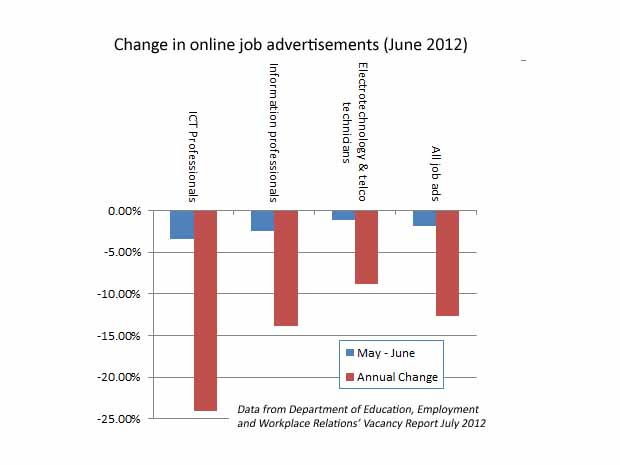JobWatch: jobs down; and staying down?

The latest employment statistics make depressing reading for job seekers. The big question is: are jobs disappearing in the short term because of a global downturn, or is this part of a far-reaching restructure within the industry?
With infrastructure moving into the cloud, is there a need for quite so many IT managers? When you can hire developers for less than AU$15 hour in India or the Philippines, is there a need to employ a far more expensive Aussie coder to do the job? It's a rather pessimistic picture, but is there a risk that we will become consumers of technology, with far less development and management of it happening locally?
Could this be the reason why we are seeing such an astronomical fall in the number of job advertisements over the last year? Figures gathered by the Department of Education, Employment and Workplace Relations (DEEWR) show that the number of vacancies for ICT professionals advertised on the internet fell almost a quarter over the last year.

Even though that seems like a staggering drop, there are a couple of points to consider: first, all jobs, across all sectors, are down by 13 per cent, a sign, surely, that the economy has slowed. Secondly, a drop in advertisements doesn't necessarily equate with a fall in job numbers; it could be that turnover has slowed to a trickle.
Still, the news doesn't look good. Fortunately, there are some jobs for which there will always be demand: companies will always need someone to identify needs and turn objectives into solutions. That's good news for business analysts and information management consultants. Project managers will still be needed, too, but perhaps not as many as in the past, and those that succeed will probably need experience in outsourcing huge chunks of work.
Fortunately, all coding jobs haven't migrated overseas, yet. In its July-September 2012 Quarterly Report, Hays believes that senior java developers and senior .net developers are being sought for new projects, particularly in relation to cross-platform developments and innovation in the online and mobile space. They say system engineers with VMWare experience are also in demand, as are candidates with expertise in virtualisation, particularly from consultancies who want to sell on this skill to their clients.
Then there are the roles configuring applications to meet business needs. SharePoint consultants are a particular example, with Hays saying demand here is so high that they've seen candidates with a low level of experience placed into projects.
Perhaps that's where the future prospects lie — for specialists with the capacity to understand business issues and implement existing software solutions, with minimal local development; using applications developed overseas at AU$15 per hour.